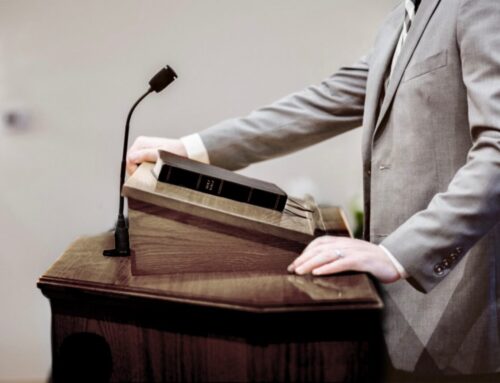God Cannot Learn
By A.W. Tozer
Lord, Thou knowest all things; Thou knowest my downsitting and mine uprising and art acquainted with all my ways. I can inform Thee of nothing and it is vain to try to hide anything from Thee. In the light of Thy perfect knowledge I would be as artless as a little child. Help me to put away all care, for Thou knowest the way that I take and when Thou hast tried me I shall come forth as gold. Amen.
To say that God is omniscient is to say that He possesses perfect knowledge and therefore has no need to learn. But it is more: it is to say that God has never learned and cannot learn.
The Scriptures teach that God has never learned from anyone. “Who hath directed the Spirit of the Lord, or being his counsellor hath taught him? With whom took he counsel, and who instructed him, and taught him in the path of judgment, and taught him knowledge, and shewed to him the way of understanding?” “For who hath known the mind of the Lord? Or who hath been his counsellor?” These rhetorical questions put by the prophet Isaiah and the apostle Paul declare that God has never learned.
From there it is only a step to the conclusion that God cannot learn. Could God at any time or in any manner receive into His mind knowledge that He did not possess and had not possessed from eternity, He would be imperfect and less than Himself. To think of a God who must sit at the feet of a teacher, even though that teacher be an archangel or a seraph, is to think of someone other than the Most High God, maker of heaven and earth.
Verse
Who has understood the mind of the Lord, / or instructed him as his counselor? Isaiah 40:13
Thought
If God could at any time receive into His mind knowledge that He did not possess, He would be imperfect and less than Himself.
Prayer
Lord, You know all things. You know our comings and goings and are acquainted with all our ways. Amen!
Why God Waits
by Pastor Cornelius R. Stam
The Apostle Peter was not wrong when he declared at Pentecost that the last days had begun (Acts 2:16,17). They had indeed begun, but God had a secret plan to give the world a period of grace before putting down its rebellion and sending Christ to reign.
This secret purpose concerning “the dispensation of the grace of God” is the subject of Paul’s epistles. However, it is interesting to see how Peter’s last message explains the reason for this interruption in God’s prophesied program and the delay in Christ’s return to reign. First, he says in II Peter 3:8:
“But, beloved, be not ignorant of this one thing, that one day is with the Lord as a thousand years, and a thousand years years as one day.”
Mark well, this is not our feeble explanation now as to the delay in Christ’s return. This statement was made at the beginning of this time of waiting, at the dawn of the age of grace. But let us go on with Peter’s declaration:
“The Lord is not slack concerning His promise… but is longsuffering to us-ward, not willing that any should perish, but that all should come to repentance” (Ver. 9).
So the delay in Christ’s return to judge and reign should not be counted “slackness” or laxness, but longsuffering. Thus the Apostle goes on to say:
“And account that the longsuffering of our Lord is salvation…”
Where did Peter get this information? How did he know about “the dispensation of the grace of God”? Verse 15 explains:
“Even as our beloved brother Paul also, according to the wisdom given unto him, hath written unto you.”
To Paul particularly was committed “the gospel of the grace of God” which we proclaim today (Acts 20:24). Peter recognized this (Galatians 2:2,7,9), and closed his second epistle with the exhortation:
“But grow in grace, and in the knowledge of our Lord and Savior Jesus Christ” (II Peter 3:18).
God Will Not Compromise
By A.W. Tozer
God never changes moods or cools off in His affections or loses enthusiasm. His attitude toward sin is now the same as it was when He drove out the sinful man from the eastward garden, and His attitude toward the sinner the same as when He stretched forth His hands and cried, “Come unto me, all ye that labour and are heavy laden, and I will give you rest.”
God will not compromise and He need not be coaxed. He cannot be persuaded to alter His Word nor talked into answering selfish prayer. In all our efforts to find God, to please Him, to commune with Him, we should remember that all change must be on our part. “I am the Lord, I change not.” We have but to meet His clearly stated terms, bring our lives into accord with His revealed will, and His infinite power will become instantly operative toward us in the manner set forth through the gospel in the Scriptures of truth.
Fountain of being! Source of Good!
Immutable Thou dost remain!
Nor can the shadow of a change
Obscure the glories of Thy reign.
Earth may with all her powers dissolve,
If such the great Creator will;
But Thou for ever art the same,
I AM is Thy memorial still.
From Walker’s Collection
Verse
“Come to me, all you who are weary and burdened, and I will give you rest.” Matthew 11:28
Thought
God cannot be persuaded to alter His Word or talked into answering a selfish prayer. We cannot change God.
Prayer
Teach us Father how to meet Your terms, how to bring our lives into accord with Yours.
It’s a Matter of the Heart
by Pastor John Fredericksen
In recent months, my wife’s father has had a series of issues with his heart that required different pacemakers to be implanted. After two previous by-pass operations, there have been justifiable reasons to be concerned about him. So, when we see or call him, we frequently ask, “How is your heart today?”
The condition of one’s heart is just as important in the spiritual realm as it is in the physical realm. It is for this reason the Scriptures say so much about the heart and why Solomon wrote, “Keep thy heart with all diligence; for out of it are the issues of life” (Proverbs 4:23). The spiritual condition of one’s heart will determine how one responds to the Lord and, ultimately, it will have a huge impact on each of us in eternity.
Since God is “not willing that any should perish” (II Peter 3:9) and “lighteth [or draws to Himself] every man that cometh into the world” (John 1:9), everyone has the option to be saved from eternal punishment. The Lord seeks with every individual to do what He did with Lydia, “whose heart the Lord opened” (Acts 16:14): drawing him or her to a personal decision of saving faith in the Lord Jesus Christ. However, because many resist and refuse this internal wooing of the Lord, they remain as some to whom Paul wrote in the Roman epistle: “But after thy hardness and impenitent heart treasurest up unto thyself wrath against the day of wrath and… righteous judgment of God” (Romans 2:5).
Thankfully, many choose to open their hearts to the salvation God offers. Countless numbers of people have “call[ed] on the Lord out of a pure heart” (II Timothy 2:22). Hosts of believers today seek to leave behind the regular practice of sin because they “have obeyed from the heart that form of doctrine which was delivered you” (Romans 6:17). On a daily basis, most believers pursue a walk that will please the Lord because “in singleness of heart, fearing God…[they choose to] serve the Lord Christ” (Colossians 3:22-24). Many believers are “doing the will of God from the heart” (Ephesians 6:6). Those who choose such a path do so because they are choosing to “keep their heart with all diligence.” They do so by regularly taking in the Word of God and applying proper truth to the way they live each day.
It is, of course, possible for a believer to choose a path of sinful living. Every believer can choose to allow his heart to grow cold to the things of the Lord. For those who do, the Apostle Paul warned that, while still saved, they could reach a spiritual condition of “having the understanding darkened, being alienated from the life of God… because of the blindness of their heart” (Ephesians 4:18). Such a condition is the spiritual equivalent of a blockage to the heart. Knowing that as believers “we shall all stand before the judgment seat of Christ… [and] every one of us shall give an account of himself to God” (Romans 14:10,12), it behooves every believer to maintain a soft, responsive heart to the Lord.
Dear believer, how is your heart today, in a spiritual sense? If you have made past decisions of sinfulness that have hardened your heart, you can choose to open the door of your heart and begin to live for the Lord again. You can begin today. You can begin to read the Scriptures again, talk to the Lord in prayer, and seek a church where the truths of God’s Word are faithfully taught. If your heart has been faithfully following the Lord, “Praise His Name.” May we all seek to apply the wise counsel from Solomon to “keep thy heart with all diligence; for out of it are the issues of life.”
God Uses Change as a Lowly Servant
By A.W. Tozer
Yet the change is deeper and more basic than any external acts can reveal, for it includes also the reception of life of another and higher quality. The old man, even at his best, possesses only the life of Adam: the new man has the life of God. And this is more than a mere manner of speaking; it is quite literally true. When God infuses eternal life into the spirit of a man, the man becomes a member of a new and higher order of being.
In the working out of His redemptive processes, the unchanging God makes full use of change and through a succession of changes arrives at permanence at last. In the Book of Hebrews this is shown most clearly. “He taketh away the first, that he may establish the second,” is a kind of summation of the teaching of that remarkable book. The old covenant, as something provisional, was abolished, and the new and everlasting covenant took its place. The blood of goats and bulls lost its significance when the blood of the Paschal Lamb was shed. The law, the altar, the priesthood—all were temporary and subject to change; now the eternal law of God is engraven forever on the living, sensitive stuff of which the human soul is composed. The ancient sanctuary is no more, but the new sanctuary is eternal in the heavens and there the Son of God has His eternal priesthood.
Here we see that God uses change as a lowly servant to bless His redeemed household, but He Himself is outside of the law of mutation and is unaffected by any changes that occur in the universe.
And all things as they change proclaim
The Lord eternally the same.
—Charles Wesley
Verse
Then he said, “Here I am, I have come to do your will.” He sets aside the first to establish the second. Hebrews 10:9
Thought
The old covenant has been abolished, and the new and everlasting covenant has taken its place. Christ, the Paschal Lamb, sacrificed His life for ours.
Prayer
Thank You, Father, for the shed blood of Your Son, Christ Jesus, that changes us from sinners into Your children.
Change Is a Gift from God
By A.W. Tozer
The sacred writers, too, face up to man’s mutability, but they are healthy men, and there is a wholesome strength in their words. They have found the cure for the great sickness. God, they say, changes not. The law of mutation belongs to a fallen world, but God is immutable, and in Him men of faith find at last eternal permanence. In the meanwhile change works for the children of the kingdom, not against them. The changes that occur in them are wrought by the hand of the in-living Spirit. “But we all,” says the apostle, “with open face beholding as in a glass the glory of the Lord, are changed into the same image from glory to glory, even as by the Spirit of the Lord.”
In a world of change and decay not even the man of faith can be completely happy. Instinctively he seeks the unchanging and is bereaved at the passing of dear familiar things.
O Lord! My heart is sick,
Sick of this everlasting change;
And life runs tediously quick
Through its unresting race and varied range:
Change finds no likeness to itself in Thee,
And wakes no echo in Thy mute Eternity.
Frederick W. Faber
These words of Faber find sympathetic response in every heart; yet much as we may deplore the lack of stability in all earthly things, in a fallen world such as this the very ability to change is a golden treasure, a gift from God of such fabulous worth as to call for constant thanksgiving. For human beings the whole possibility of redemption lies in their ability to change. To move across from one sort of person to another is the essence of repentance: the liar becomes truthful, the thief honest, the lewd pure, the proud humble. The whole moral texture of the life is altered. The thoughts, the desires, the affections are transformed, and the man is no longer what he had been before. So radical is this change that the apostle calls the man that used to be “the old man” and the man that now is “the new man, which is renewed in knowledge after the image of him that created him.”
Verse
And we, who with unveiled faces all reflect the Lord’s glory, are being transformed into his likeness with ever-increasing glory, which comes from the Lord, who is the Spirit. 2 Corinthians 3:18
Thought
Our ability for change is a golden treasure, a gift from God of fabulous worth. For us, the whole possibility of redemption lies in our ability to change.
Prayer
Father, are hearts are eternally grateful for that great gift of change You have given us.
No Change Is Possible with God
By A.W. Tozer
“All that God is He has always been, and all that He has been and is He will ever be.” Nothing that God has ever said about Himself will be modified; nothing the inspired prophets and apostles have said about Him will be rescinded. His immutability guarantees this.
The immutability of God appears in its most perfect beauty when viewed against the mutability of men. In God no change is possible; in men change is impossible to escape. Neither the man is fixed nor his world, but be and it are in constant flux. Each man appears for a little while to laugh and weep, to work and play, and then to go to make room for those who shall follow him in the never-ending cycle.
Certain poets have found a morbid pleasure in the law of impermanence and have sung in a minor key the song of perpetual change. Omar the tentmaker was one who sang with pathos and humor of mutation and mortality, the twin diseases that afflict mankind. “Don’t slap that clay around so roughly,” he exhorts the potter, “that may be your grandfather’s dust you make so free with.” “When you lift the cup to drink red wine,” he reminds the reveler, “you may be kissing the lips of some beauty dead long ago.”
This note of sweet sorrow expressed with gentle humor gives a radiant beauty to his quatrains but, however beautiful, the whole long poem is sick, sick unto death. Like the bird charmed by the serpent that would devour it, the poet is fascinated by the enemy that is destroying him and all men and every generation of men.
Verse
But we have this treasure in jars of clay to show that this all-surpassing power is from God and not from us. 2 Corinthians 4:7
Thought
We are fragile and prone to change, always in constant flux. In us, change is impossible to escape.
Prayer
Your immutability, Father, guarantees our salvation. You cannot change, and because of that, we can trust you implicidly














Leave a Reply, please --- thank you.